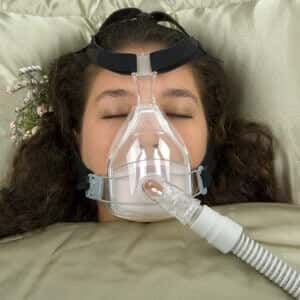
Obstructive sleep apnea affects tens of millions of Americans. In this condition the airway is briefly but repeatedly closed off, leading to gasping or snoring as a way of re-establishing air flow.
Sleep apnea can complicate conditions such as hypertension, heart disease or diabetes. It may affect as many as 5 % of adults, and is especially common among older people and the overweight.
CPAP
There are no medications for sleep apnea, but it is treated with medical devices. Most common is the CPAP machine, providing continuous positive airway pressure (see picture). Some people are treated with a mandibular advancement device, which moves the lower jaw forward to improve breathing through the mouth.
A meta-analysis of 23 studies found that CPAP treatment alleviated symptoms of depression as well as sleep apnea. People who were depressed at the beginning of the study got the most noticeable response.
The studies also found benefit from the mandibular advancement devices, but the response was modest. The investigators suggest that doctors will need more research to select the patients who will benefit most from sleep apnea treatment.

